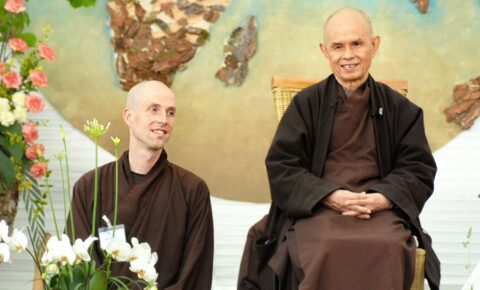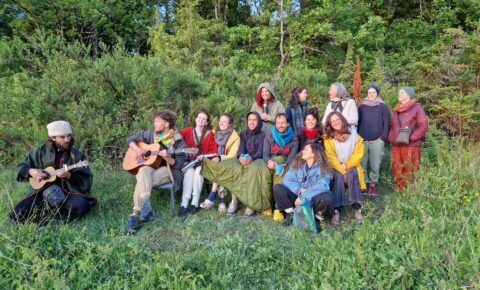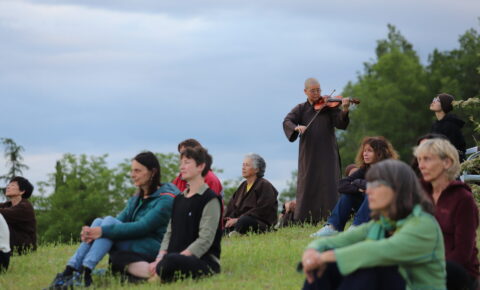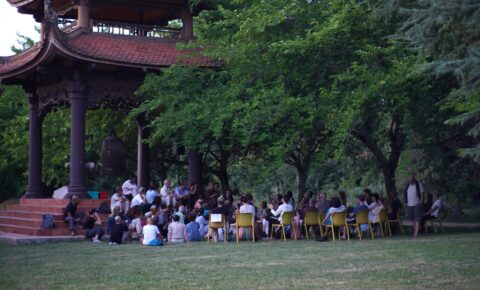Brother Chan Phap Huu
In 2023, Plum Village monastics went on their first music tour across North America, titled “The Way Out Is In: A Musical Meditation.” It offered a unique blend of contemplative music, poetry and short, inspiring teachings. The tour started on 21 April in Baltimore, went on to Washington D.C. and Boston, and ended with a concert in Toronto, Canada on 1 May. The following is a summary of an interview the editorial team conducted with Br. Phap Huu on 2 January 2024.
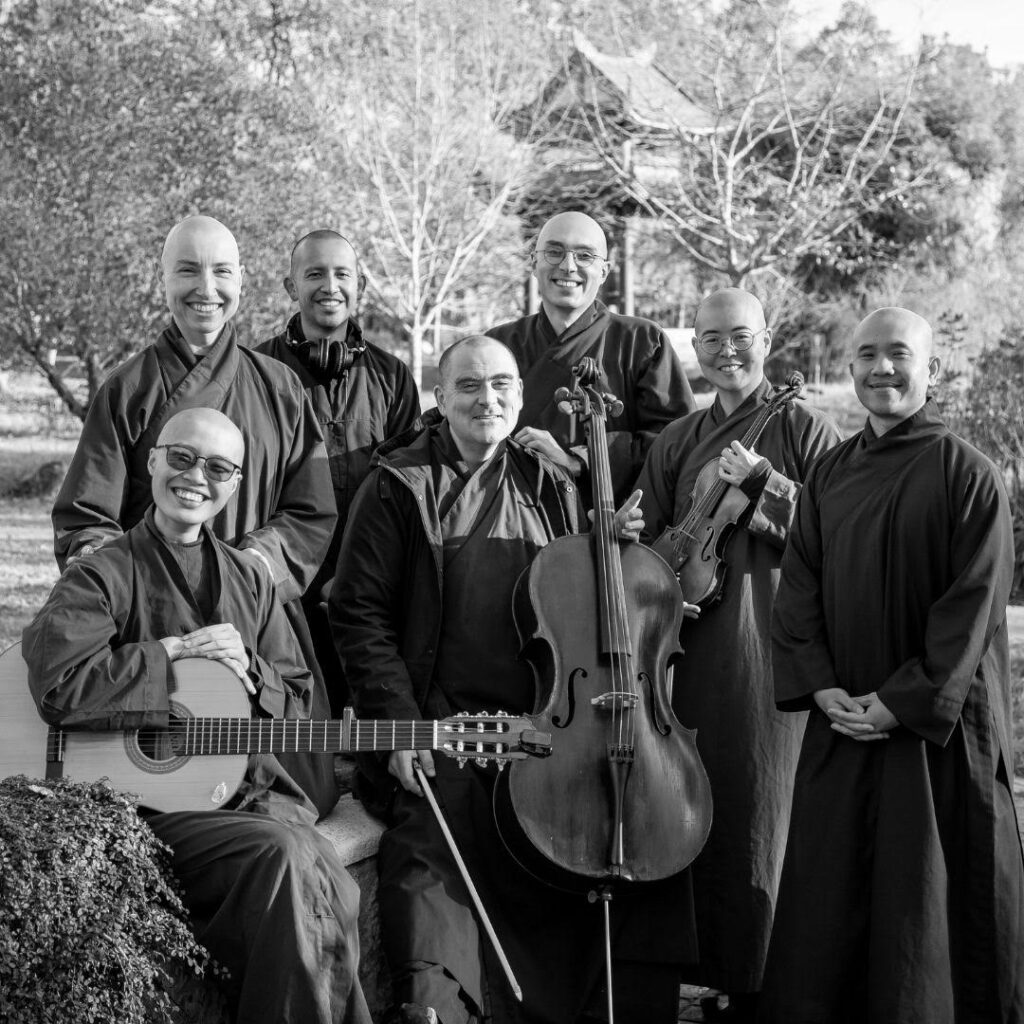
Flexibility and Openness
When we started, we had a vague idea to weave music into the reading of Thay’s poetry about the story of a river, very much in the same way we had done for various music and meditation offerings in Plum Village retreats. However, Sr. True Dedication and I — the two MCs — realized that 90% of the audience wouldn’t understand the poem because it’s quite deep. We’d have to explain it. It worked in our retreats because the audience — retreatants and monastics — were already familiar with the Plum Village metaphor of “going as a river.” But on tour, people might come to the event because they heard about it from their friends. We felt that the poetry of Thay wouldn’t really land with them.
Fortunately, one of the highlights of the tour was our flexibility and openness. We decided to weave what mindfulness is and what our Dharma is into what we called “bite-sized Dharma talks” for five or seven minutes, which would then lead into the music.
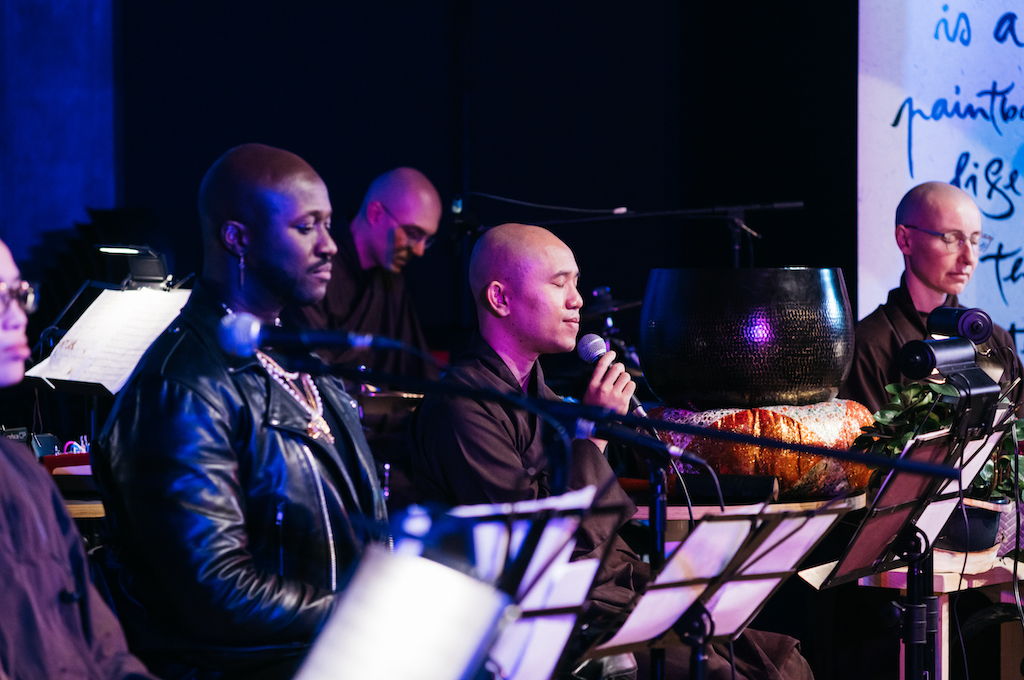
It helped set the foundation. We started off with “Who is Thay?” because our promotional leaflet spoke of the tour being a dedication to Thay’s legacy. Then, we shared about the spirit of Engaged Buddhism, of Thay’s creativity and openness to make sure that the Dharma continues to bring joy to people.
In the early days, many people knew Thay as a peace activist and a poet rather than as a monk. His poetry was his way of channeling his experiences during the war. His first communities were young activists working in war-torn villages, seeing death, orphans and bodies dismembered by bombs on a daily basis. That is where our Days of Mindfulness in the Plum Village tradition come from. Our teacher had the insight that we needed to come together once a week as a community to celebrate the miracle of life — Buddhism as a way of life. The weekly gatherings were meant to highlight the beauty of the present moment, as well as to shine the light of mindfulness on suffering, to see its roots, to care for it, to transform it, and to cultivate new insights and wholesome seeds inside ourselves.
On those Days of Mindfulness, Thay allowed the young social workers to bring guitars and drums to make music and sing together. A lot of Thay’s poems were put into music. He also brought in a lot of artists, songwriters, singers, poets, who later became very well known in Vietnam.
Music was very important for Thay. Making music was one of Thay’s side quests. He was an amazing artist himself.
A Bridge To Bring More People Into Spirituality
After an introduction to Thay, we spoke about mindful breathing because the first song was about the sixteen exercises of mindful breathing. Mindfulness is always mindfulness of something, so we then talked about mindfulness of suffering as it led into a song, called “Night of Prayer,” based on a poem by Thay. Sometimes the spoken words would be accompanied by the cello or piano. These contemplative moments created an experience of the Dharma infused with music and meditation.
We were lucky to have a group of monastics who were previously professional musicians, like Br. Phap Linh (Br. Spirit) on the cello and Sr. Trai Nghiem on the violin. It was a complex ensemble of songs that integrated melody, strings, rap, and drums, with the flavor of pop, hip-hop, and contemporary culture. It was very diverse — a dynamic bridge to bring more people into spirituality. For the younger generation of practitioners like us, spirituality doesn’t just mean becoming a Buddhist or following a religion.
Spirituality is the capacity of awakening in everyone, which is to learn the art of stopping, to connect with our suffering, take care of it, and transform it with compassion.
Many people shared after the sessions that they experienced a deep sense of peace and groundedness. Since we were monastics, many people expected very slow, contemplative music. So the moment we threaded in a more upbeat song and some rap, people were taken aback: ‘Wow!’ They couldn’t believe that this was a part of it. It helped reshape their viewpoint of the liberation and freedom monastics have to offer the Dharma in creative ways, to bring the language of Buddhism, of awakening and mindfulness, into the mainstream of society.
Moreover, the tour helped us break free from our own view of who we are. As long as it still touches the core principles and wisdom of the Dharma, we should have the courage to just do it. This is our teacher’s wisdom.
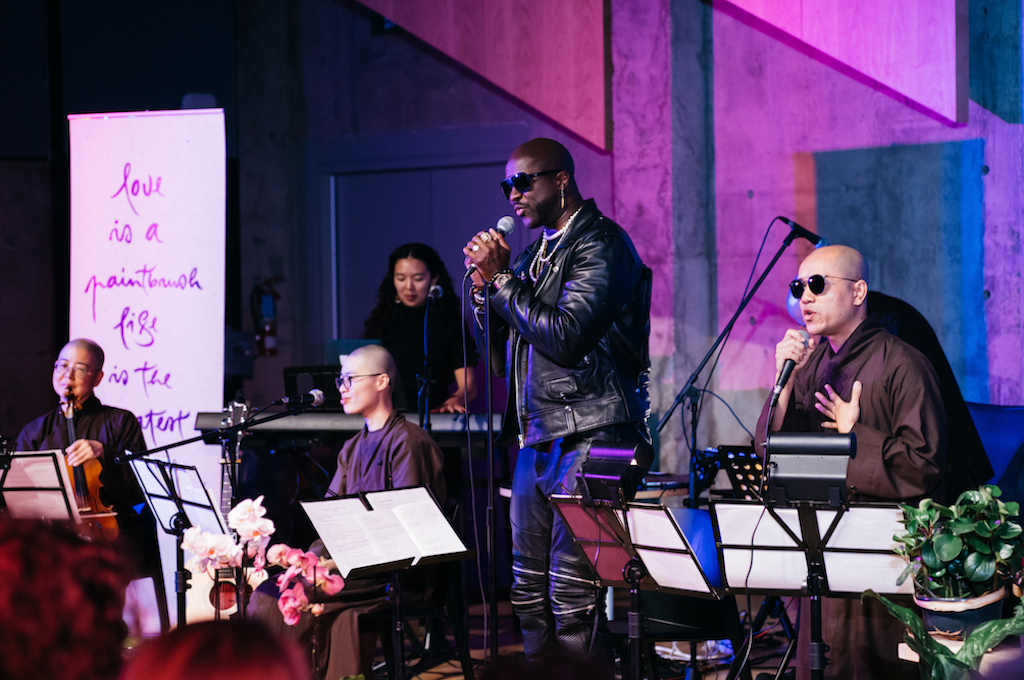
Where Is The Album?
Many people asked us, “Where’s the album? I want to hear this. I want this on Spotify. I want this on Apple Music. I want to be listening to this song as I drive to work, or when I have an emotional moment. I want this music for me to take refuge in.” Normally, bands need to have an album first for people to know about them, because when people like the music, then they will want to hear it live. Some couldn’t believe that we didn’t have an album. A couple felt so inspired and asked, “How can this be beyond luck? How can it reach beyond the Plum Village circle? What do we need?” After some reflections with Br. Phap Linh, we realized what we were missing was a producer.
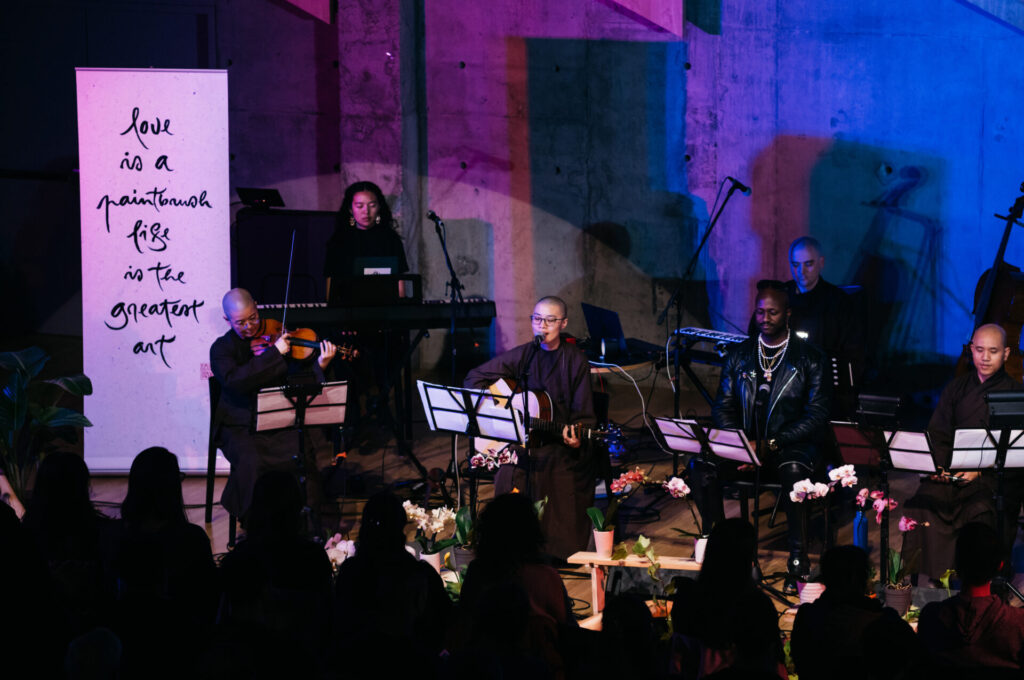
We have the talent, but we needed someone to thread everything together. This became one of the beautiful fruits of the tour: a birth of a new album, called “A Cloud Never Dies,” which we will release in the summer of 2024.
Jack Peñate, who is an amazing artist himself, became the chosen producer. During the 3-week recording process, some of us regularly sat together, lit incense, drank tea and shared about our deepest aspirations. Being in the spirit of Thay’s embrace in the Toadskin Hut, everything felt energized by Thay’s Dharma. It was a beautiful atmosphere.
We wanted the music to take people on a journey, holding a space for them to pray, to grieve, to feel whatever is in them, but also a space for them to cultivate hope and to inspire action.
It was our deep intention for the music to be an act of service in itself. Jack realized that we were attached to our performances during the tour, and encouraged us to let go of the past, to enjoy jamming together to capture something fresh, and allow the music to come naturally.
At first, we kept saying we’ll allow one year for the album to ripen. But by day eight or ten, Jack and I looked at each other and I said, “I think we have an album. I think it’s coming together.” And Jack said, “Br. Phap Huu, I didn’t want to say it because I didn’t want to jinx it, but I think you’re right. I think it’s there. Wow!” I’ve never met anyone of Jack’s talent; yet, he’s so humble. He even came back just for Thay’s birthday to play bass for the concert we offered at the end of the climate retreat. When we invited him, he said that “it would be his greatest honor” because he felt this was now also his Sangha, his family, and he wanted to give homage to such a beautiful spiritual teacher.
Jack said what he learned from the music and his time spent with us was compassionate leadership.
He saw how much respect we offered him, and how much we allowed him to lead. He said, “I thought I was coming to grieve. But what I learned was siblinghood, togetherness, compassionate leadership, deep listening, loving speech, and also to trust, continue to trust.” That also was a learning experience for me.
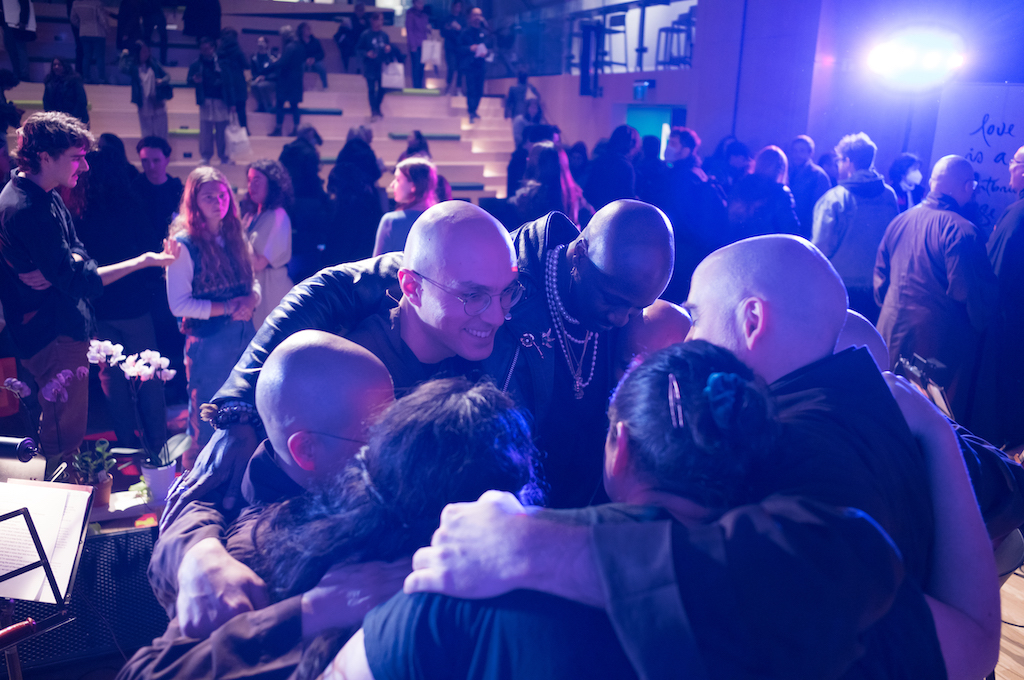
At one point, I mentioned to Jack that Thay often said, “Let the ancestors move you.” I really felt throughout this whole journey from the concert to the album that we have been supported by our ancestors, spiritual and genetic.
The path is always there, but sometimes we have to sweep the ground for that path to reveal itself.
Click here to read more in the Plum Village Newsletter.
Click here to follow to Plum Village Band and get ready for the album’s release on Bandcamp.



